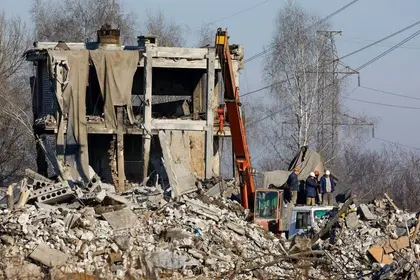The fallout from Ukraine’s devastating New Year strike on an army barracks in the Russian-occupied town of Makiivka is becoming a major headache for the Kremlin, with no signs of fading and continuing calls for someone to be held responsible.
Remind me, what happened?
JOIN US ON TELEGRAM
Follow our coverage of the war on the @Kyivpost_official.
Shortly after the new year began, Ukrainian forces struck an unprotected compound housing hundreds of newly mobilized Russian troops in the occupied town of Makiivka in the Donetsk region.
- Receive the latest Ukraine news bulletins for today.
- Find the latest Ukraine news published as of today.
Russian officials have acknowledged that at least 89 people were killed but Ukrainian sources as well as many Russian war correspondents say the death toll is closer to 400.
Even the lower figure would represent the biggest loss of life from a single strike as officially reported by Moscow since the start of the invasion in February.
Why such a high figure from a single attack?
Ukraine used U.S.-supplied Himars rocket systems to conduct the strike and there are reports that ammunition was being stored in the same building as the troops, causing devastating secondary explosions.
So, it’s the fault of the military who were responsible for the troops?
You’d think so, but Russia’s top brass on Wednesday tried to shift the blame onto the dead soldiers themselves, accusing them of the banned use of personal mobile phones which were then tracked and located by Ukrainian forces.

Zelensky Condemns Russian ‘Inhumane’ Christmas Attack on Energy Grid
It’s feasible that this occurred – since the early days of the war, the lax use of mobile phones by troops has allowed both sides to pinpoint the location of the enemy, but it still doesn’t account for the decision to house the troops in an unprotected building packed with explosive material.
Is the Russia military conducting an investigation?
Russian Lieutenant General Sergei Sevryukov has announced a commission to investigate what allowed Ukraine to carry out such a deadly strike, but that the main reason was “already obvious”.
"The main reason for what has happened was the turning on and massive use by personnel of mobile phones within reach of enemy weapons contrary to the ban," he said.
It doesn’t seem very fair to blame the dead troops…
It’s not, and since Sevryukov spoke, a number of regional Russian officials have praised the bravery of the troops.
Denis Pushilin, the Moscow-installed head of Donetsk, hailed their "heroism” in a post on Telegram, adding: “The majority of them, after barely getting out of the building hit by American Himars and regaining consciousness, returned back to pull out their comrades.”
In another Telegram post released late Wednesday, he said he had visited the wounded with Viktor Goremykin, Russia's deputy defense minister, and Dmitry Azarov, governor of the Samara region where some of the victims came from.
“Almost all of the injured have been transferred to other regions of Russia for medical attention, Pushilin said.
“In comments to local media, Azarov hailed the "courage" of the troops.
“After the shelling, soldiers and officers – wounded and with concussion – saved others, pulling comrades from under the rubble,” he said.
Among the dead were rank-and-file soldiers as well as “representatives of the command staff,” he said.
Surely comments like this make it more difficult to pin the blame on them?
Potentially yes, and given the strike has also led to rare public displays of grief, including in Russia's Samara region on the Volga River, home to some of the victims, it’s not yet clear how far up the chain of command the blame will have to lie in order to assuage public anger.
Will Putin be held responsible?
Unlikely. So far, Russian President Vladimir Putin has not commented on the strike and is not being held directly responsible. The Kremlin will be hoping that blame can be pinned solely on military commanders.
But in a sign of just how seriously the criticism is being taken by the Kremlin, Margarita Simonyan, the influential head of RT, Russia's state-controlled international TV channel, welcomed the army's promise that officials “will be held accountable.”
“I hope that the names of these persons will be announced,” she said.
“It is time to understand that impunity does not lead to social harmony. Impunity leads to new crimes. And, as a result, to public dissent.”
Where will it go from here?
That remains to be seen, but watch this space.
You can also highlight the text and press Ctrl + Enter






